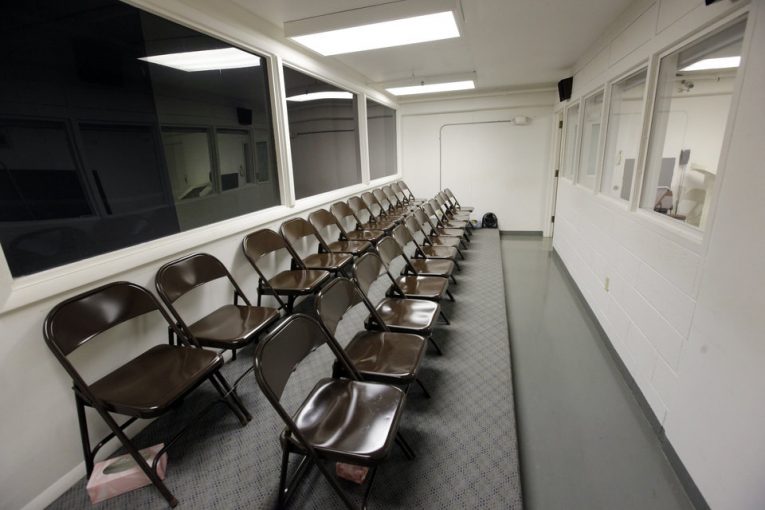

By Madi Whittemore
OKLAHOMA CITY, OK – A “Don’t Kill for Me” demonstration to protest the execution of Oklahoma death row inmate, Jemaine Cannon—scheduled to be killed Thursday, July 20—will be held earlier in the day by the Oklahoma Coalition to Abolish the Death Penalty (OK-CADP).
The demonstration will commence in front of the Oklahoma Governor’s Mansion at 9 a.m. and a silent vigil will be held at 10 a.m. —the time of Cannon’s execution.
If a stay of execution is not granted and the execution occurs, the demonstration will end with a silent prayer, said the anti-death penalty group.
In 2021, Oklahoma resumed its use of the death penalty following a six-year moratorium of abstaining from execution and the state currently holds one of the highest rates for execution in the U.S.
Cannon is currently the sixth inmate on a list of 25 people scheduled to be executed in Oklahoma through 2024.
On Feb. 3, 1995, Sharonda White Clark was found fatally stabbed in a residence in which she was living temporarily with Cannon. Cannon was found guilty by a jury of the murder of White and was sentenced to death in 1996.
However, Cannon has maintained his innocence in the murder of Clark, claiming self-defense which resulted in him “blindly” swinging the knife.
Cannon attempted to get clemency (leniency to reduce his sentence) on June 7 but the Oklahoma Pardon and Parole Board denied clemency in a 3-2 vote. Board members Richard Miller, Richard Smotherman and Cathy Stocker voted against clemency and Calvin Prince and Edward Koniecxny voted in favor of clemency.
State Attorney General Gentner Drummond later explained he was pleased by the board’s decision against clemency, calling Clark’s death a “horrific loss” that desperately needs “finality.”
However, following the denial of clemency, several problems with Cannon’s original trial were highlighted, including officials overlooking DNA evidence and Cannon not being allowed to testify.
Cannon had multiple defensive knife cuts on his hands when he was taken into custody, but according to the defense, at the crime scene, law enforcement officers neglected to do DNA analysis for the blood found on the knife used to stab Clark.
The defense claims Cannon’s blood had been found on the knife; this evidence would have been useful in Cannon pleading innocent by means of self-defense.
Additionally, Cannon was not allowed to be a witness in front of the jury and as a result there was little evidence for Cannon’s claim to self-defense, said Cannon’s lawyers. According to Cannon, he wished to explain to the jury his side of the story and his actions.
Cannon explained in the clemency packet that a verbal altercation broke out between him and Clark after a neighbor entered the residence, requesting money from them. Clark refused and expressed immense anger toward said neighbor, according to news reports.
Cannon, who had already planned on leaving Clark’s residence that day, began packing up his belongings which angered Clark even more—prompting her to attempt to physically stop Cannon from leaving.
Cannon added that the physical altercation continued, with Clark eventually charging at Cannon with a knife, attempting to stab him. Cannon conceded he eventually managed to get possession of the knife, stabbing Clark out of self-defense for his own safety.
In addition to Cannon’s self-defense claim, Cannon suffered from severe emotional and physical abuse as a child by his mother and stepfather, according to his lawyers.
OK-CADP Chair Don Heath recently stated, “Jemaine Cannon was physically abused by his mother and stepfather over his entire childhood. He suffers from Complex Post Traumatic Stress Syndrome. Cannon told a police investigator that he just snapped.”
As a result of the abuse and in addition to suffering from PTSD, Cannon also suffers from Sarcoidosis Stage III which impairs his audio, eyesight, lungs, liver, and spleen while also struggling with asthma, keratoconus, and uveitis, said his supporters.
Heath cited the role of Cannon’s childhood abuse in the case, adding, “It is hard for anyone who grew up in middle-class homes with stable and loving parents to imagine the trauma Mr. Cannon suffered as a child and the role it played in his violent life.”
Cannon, now 51, has been on death row for 27 years and has not had any reported violent incidents or behavior while incarcerated, said OK-CADP, noting he has close relationships with many of his family members including his mother, grandmother, and other relatives.
Heath maintains, “Mr. Cannon should be allowed to live out his remaining days in peace. The State has neither given him any treatment for his PTSD nor offered him any assistance for being blind and nearly deaf. Instead, the State seeks to compound the tragedies of his life with another tragedy.”
Organizations like OK-CADP note, “We cannot imagine how a normal human being could act that way. For the State to kill him is not justice, it is cruelty.”
As stated, Cannon’s execution is currently scheduled for 10 a.m. on Thursday July 20, pending any decisions by Oklahoma to grant a stay or postponement of execution.
